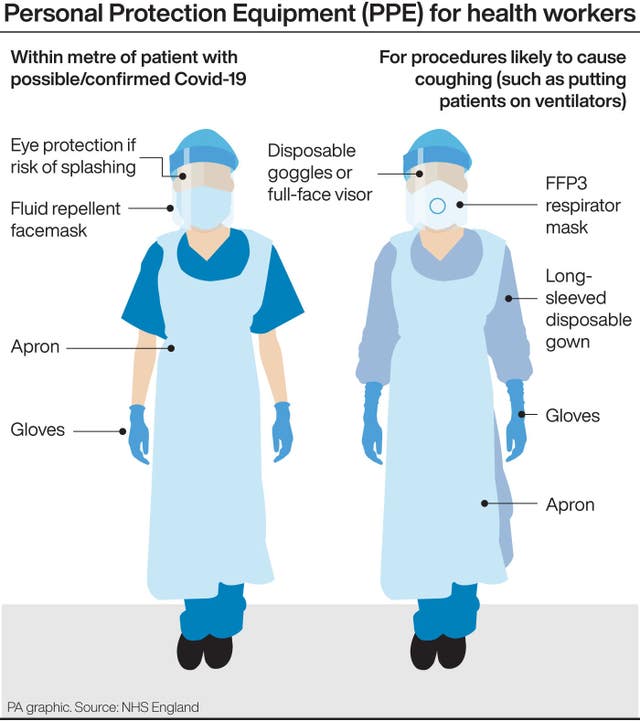/cloudfront-us-east-1.images.arcpublishing.com/expressandstar.mna/ZVSFHGKNOJGPJPBHCCO32TMC7M.jpg)
BAME nurses ‘less protected’ as PPE shortages persist, poll finds
‘Deeply worrying’ survey reveals that BAME workers feel less protected than those from other backgrounds.
Black, Asian or minority ethnic (BAME) nurses are more likely to have problems accessing protective equipment, according to a new poll.
The Royal College of Nursing (RCN) identified a “stark and deeply worrying” contrast over PPE provision for staff from different backgrounds.
The union said it is “unacceptable” that BAME nurses “are less protected than other nursing staff”.
Data has emerged suggesting that people from BAME backgrounds are being disproportionately adversely affected by Covid-19.
A significant proportion of NHS workers who have died after being diagnosed with Covid-19 have BAME heritage.
The RCN conducted a poll on more than 5,000 nurses about the provision of personal protective equipment (PPE), including more than 700 from BAME backgrounds.
The union said that although there were some improvements from April, “there are still shortages of essential PPE in all settings, and health and care staff are still reliant on PPE items being donated or home-made in some cases”.
Its report states that it is “unacceptable for health and care staff to be exposed to avoidable risk to their own safety”.
“Our findings also highlighted a stark and deeply worrying contrast in the experience and safety of BAME respondents,” the report adds.

The findings include:
– 29% of white British nurses who responded to the poll felt pressure to care for confirmed or possible Covid-19 patients without adequate PPE – this rose to 56% for BAME nurses.
– Less than half (43%) of BAME nurses said they had enough eye protection compared with 66% of white British nurses.
– 37% of BAME nurses who took part in the survey said they did not have enough fluid-repellent gowns to use during their shift, with only 19% white British staff reporting the same concerns.
– More than half of BAME respondents (53%) also said they had been asked to re-use single-use PPE in a “high risk environment”, compared with 42% of white British respondents to the survey, which was conducted between May 7-11.
RCN chief executive and general secretary Dame Donna Kinnair said: “It is simply unacceptable that we are in a situation where BAME nursing staff are less protected than other nursing staff.
“These results reinforce our call for BAME nursing staff to have specific risk assessments to reflect the risks they face as a result of Covid-19.
“All of our nursing staff must have the protection they need, and action must be taken urgently to ensure they are all kept safe. We look forward to getting more answers from Public Health England’s investigation into the disproportionate effect of Covid-19 on BAME groups.”
Andrea Sutcliffe, chief executive and registrar of the Nursing and Midwifery Council, said she was “deeply concerned” by the survey, adding: “All health and care professionals, no matter their background, should have access to the PPE they need to keep themselves and those they care for safe.
“The Covid-19 pandemic has exposed deep seated inequalities for ethnic minority nursing and midwifery professionals. Their experiences cannot be ignored and I hope this survey leads to concerted action by all partners across the health and care system to secure much needed improvements.”
Health Secretary Matt Hancock has announced that the Government has made “significant progress” on PPE issues.
He said that the Government was not only keeping up with demand, but is now in a position to replenish stockpiles.
But he also announced that there are still 98 NHS workers in hospital who have tested positive for coronavirus, including some who are “seriously ill”.
Commenting on the RCN poll, Baroness Doreen Lawrence, Labour’s race relations adviser, said: “These findings are deeply concerning and shed further light on the experiences of BAME workers on the front line.
“We know how crucial PPE is for key workers and any inequality in provision should be seriously addressed.
“The Government must ensure risk assessments for BAME staff are taking place so that all high-risk employees are adequately protected.
“We cannot – and will not – continue to ignore the structural inequalities faced by BAME workers.”
Dr Habib Naqvi, deputy director, NHS workforce race equality said: “Ahead of findings of the Public Health England investigation into the impact of Covid-19 on people from BAME backgrounds, hospitals have been asked to take the precautionary measures including risk-assessing staff at potentially greater risk, and if any colleague is concerned, they should raise this with their trust and be listened to.”